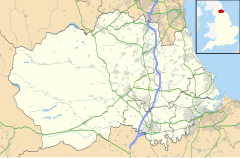Easington, County Durham
| Easington | |
|---|---|
 Old Easington village green |
|
| Easington shown within County Durham | |
| Population | 2,171 |
| OS grid reference | NZ415432 |
| Civil parish |
|
| Unitary authority | |
| Ceremonial county | |
| Region | |
| Country | England |
| Sovereign state | United Kingdom |
| Post town | PETERLEE |
| Postcode district | SR8 |
| Dialling code | 0191 |
| Police | Durham |
| Fire | County Durham and Darlington |
| Ambulance | North East |
| EU Parliament | North East England |
| UK Parliament | |
Easington is a town in eastern County Durham, England. It comprises the ancient village of Easington Village and the ex-mining town of Easington Colliery, which are separate civil parishes. It is located at the junction of the A182 leading north-west to Hetton-le-Hole. Seaham Harbour and Houghton-le-Spring, and the A19, which travels north to Sunderland and south to Middlesbrough. As a former coal mining town, Easington is now an unemployment blackspot after the mine closed in 1993. The population of Easington Village was 2,164 in 2001, increasing slightly to 2,171 at the 2011 Census.
There is evidence of Easington having been an important pre-conquest site, including architectural fragments (dating from as early as the 8th century) found within the fabric of St Mary's Church. St Mary's itself is mostly 12th–13th century, and contains a notable amount of seventeenth-century woodwork. From 1256 until 1832 the Rector of Easington was also Archdeacon of Durham. Seaton Holme (see below) served as the Rectory until around 1960.
One of the most prominent events in the long history of the village was the hanging of two men on the village green for involvement in the plot to replace Tudor monarch Queen Elizabeth with Mary, Queen of Scots. Pope Adrian IV (c. 1100–1 September 1159), born Nicholas Breakspear, lived here for a time.
The sinking of Easington Colliery began on 11 April 1899. The ward lies just north of Peterlee and the settlement grew up around the colliery. Development west along the B1283 road has resulted in a continuous settlement with Easington Village. However, the two places have retained their distinctive characters and continue to reflect different trends. Easington Colliery was the last pit to close on the Durham Coalfield in 1993, with the loss of 1,400 jobs.
...
Wikipedia

